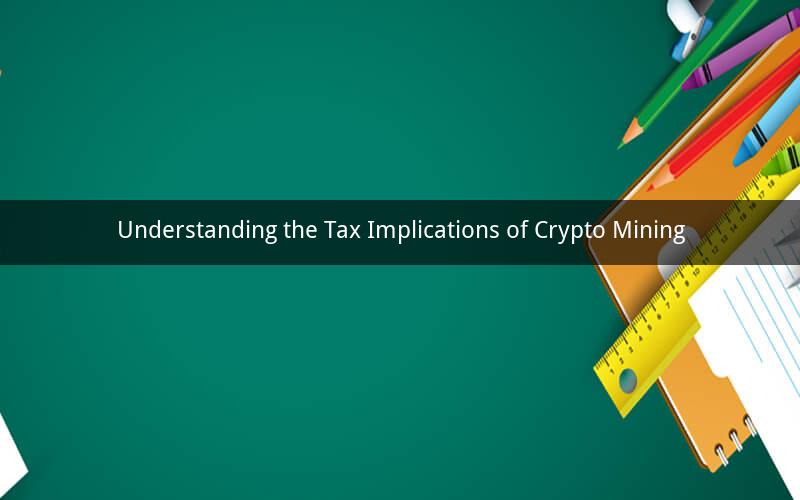
Introduction:
Cryptocurrency mining has gained significant popularity in recent years, attracting both individuals and businesses to participate in the process of validating transactions on blockchain networks. However, as with any financial activity, crypto mining raises questions about its taxability. This article delves into the complexities surrounding the taxation of crypto mining and provides insights into the regulations and considerations involved.
1. Is Crypto Mining Taxable?
Yes, crypto mining is generally taxable in most jurisdictions. The income generated from crypto mining activities is considered taxable income and must be reported on tax returns. The specific tax treatment may vary depending on the country and the nature of the mining operations.
2. How is Crypto Mining Income Taxed?
The taxation of crypto mining income depends on the country's tax laws and regulations. Here are some common approaches:
a. Income Tax: In many countries, crypto mining income is taxed as ordinary income. This means it is subject to the same tax rates applied to other forms of income, such as salaries and wages.
b. Capital Gains Tax: Some countries may treat crypto mining income as capital gains, which are taxed at a lower rate than ordinary income. However, this classification is subject to specific criteria and conditions.
c. Self-Employment Tax: In certain jurisdictions, crypto miners who operate as sole proprietors or freelancers may be required to pay self-employment taxes, which include both income tax and Social Security contributions.
3. Reporting Crypto Mining Income
Crypto mining income must be reported accurately on tax returns. Here are some key points to consider:
a. Record Keeping: Keep detailed records of all crypto mining activities, including the amount of cryptocurrency earned, the cost of equipment, electricity expenses, and any other relevant expenses.
b. Fair Market Value: Determine the fair market value of the cryptocurrency mined at the time of mining. This value is usually based on the current market price.
c. Reporting Methods: Depending on the country, crypto mining income may be reported on specific tax forms or schedules. It is essential to consult the tax authorities or a tax professional for guidance on the appropriate reporting methods.
4. Tax Planning for Crypto Miners
Tax planning is crucial for crypto miners to optimize their tax liabilities. Here are some strategies to consider:
a. Deductible Expenses: Identify and deduct any eligible expenses related to crypto mining, such as electricity costs, hardware purchases, and maintenance expenses.
b. Timing of Income Recognition: Some jurisdictions allow miners to choose the timing of income recognition, which can be beneficial for tax planning purposes.
c. Tax Residency: Understand the tax implications of your tax residency and consider the tax laws of the country where you reside or operate your mining activities.
5. International Tax Considerations
For individuals and businesses engaged in international crypto mining operations, there are additional tax considerations:
a. Double Taxation: If you are a resident of one country and mine cryptocurrencies in another, there is a possibility of double taxation. It is essential to understand the tax treaties between the two countries to mitigate this issue.
b. Reporting Requirements: Certain jurisdictions require residents to report foreign income and assets. Ensure compliance with these reporting requirements to avoid penalties.
Conclusion:
Crypto mining is taxable in most jurisdictions, and the specific tax treatment may vary depending on the country and the nature of the mining operations. It is crucial for crypto miners to understand the tax implications, maintain accurate records, and seek professional advice to ensure compliance with tax regulations. By implementing effective tax planning strategies, crypto miners can optimize their tax liabilities and minimize potential risks.
Questions and Answers:
1. Q: Can I deduct the cost of my mining equipment from my crypto mining income for tax purposes?
A: Yes, you can typically deduct the cost of your mining equipment as a capital expense over its useful life. However, the specific deduction rules and methods may vary depending on your country's tax laws.
2. Q: How do I determine the fair market value of the cryptocurrency I mine?
A: The fair market value is usually determined based on the current market price of the cryptocurrency at the time of mining. You can refer to reputable cryptocurrency exchanges or market data sources to obtain the accurate value.
3. Q: Can I deduct electricity costs from my crypto mining income?
A: Yes, electricity costs are often considered deductible expenses for crypto mining. However, the specific deduction rules and limitations may vary depending on your country's tax laws.
4. Q: Do I need to pay self-employment taxes if I am a crypto miner?
A: If you operate as a sole proprietor or freelancer, you may be required to pay self-employment taxes, which include both income tax and Social Security contributions. It is essential to consult the tax authorities or a tax professional for guidance on self-employment tax obligations.
5. Q: How can I minimize potential double taxation on my international crypto mining income?
A: To minimize potential double taxation, it is advisable to review the tax treaties between your country of residence and the country where you mine cryptocurrencies. These treaties may provide relief from double taxation by allowing for tax credits or deductions. Consulting with a tax professional is recommended to navigate international tax complexities.